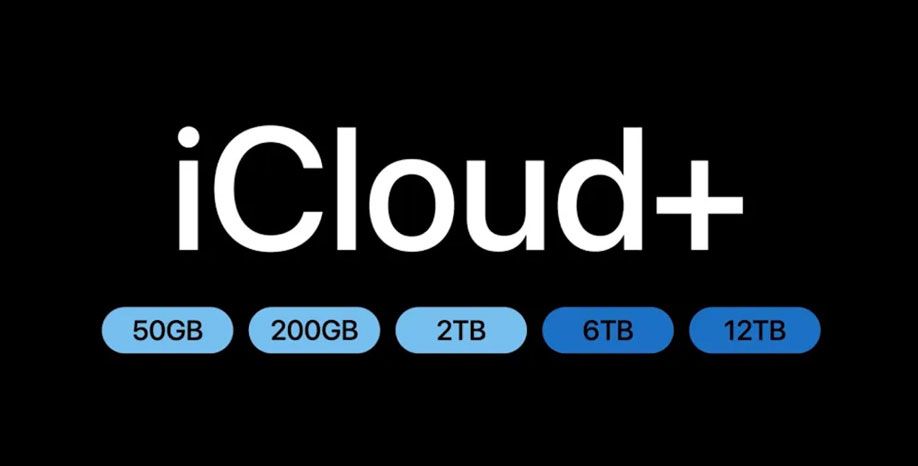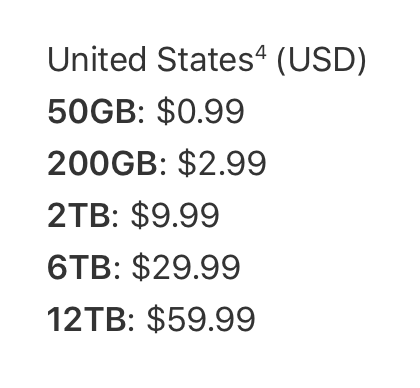Thoughts on iCloud+ Storage Tiers
Approaching the 2TB cap on my iCloud+ account, I was interested in Apple's recently announced higher end iCloud+ tiers. The new 6TB and 12TB iCloud+ plans are now available for purchase, joining the existing lineup of 50GB, 200GB, and 2TB storage options.
The jump from 2TB straight to 6TB, skipping a 4TB intermediate option, caught my attention. While having extra headroom to grow into is good, I don't want to overpay for storage I won't use.

Over the years I'm sure Apple received complaints about iCloud's 2TB cap, especially as features like Apple Pro Raw photos—75MB at 48MP—encourage more storage use. These new plans are clearly intended to satisfy larger, digital-native families and data hoarders.
When I reviewed the new iCloud+ tiers I was disappointed by the high prices. It struck me as a strategic move related more to their existing service bundles rather than an actual reflection of storage costs, especially given the advantageous deals Apple has secured with cloud providers. Let me explain.

Apple's Family Sharing makes it easy for up to six family members to share music, movies, TV shows, apps, games, books, subscriptions including iCloud+, and more, all without sharing an Apple ID. Apple bundles those services at a deeply discounted price.
As more family members join Family Sharing and back up their Apple devices to iCloud, the strain on the collective storage pool grows. While this might prompt the family organizer to consider upgrading to a larger iCloud+ plan, Apple's usage data likely shows that the 2TB option is usually more than sufficient. Apple's pricing indicates they're not keen on users going over 2TB of iCloud storage.
The steep pricing seems calibrated to prevent revenue loss from increased Family Sharing, rather than to cover the genuine cost of offering more storage space.

I suspect that the 6TB and 12TB tiers are designed to satisfy a small yet vocal group seeking more Apple storage, deter "abuse" of Family Sharing through higher pricing, and ensure the plans are generous enough to offer 5+ years of relevance.

This leads me to conclude that Family Sharing played a key role in shaping the pricing of these new tiers. If you're on a 2TB plan and think about adding a friend to your Family account, the shared storage pool becomes a constraint. While a more affordable 4TB option could've made upgrading and adding friends more attractive, the substantial $20 price hike from 2TB to 6TB serves as a deterrent. By offering more space, Apple can command a higher price, discouraging casual additions to Family Sharing unless the extra storage is crucial and the higher cost is worth it.
Apple designed Family Sharing with the intention of enabling families to collectively use Apple services, rather than allowing friends to divide subscription costs. The goal with this pricing is likely to curb the kind of abuse commonly seen with streaming services' family plans.

Higher tier iCloud+ storage prices serve as an artificial deterrent to keep bundled services exclusive to families. This becomes clear when you look at current rates: combining a $10 2TB iCloud plan with a $24 15TB Dropbox plan is $25 less per month than choosing Apple's 12TB iCloud offering at $59.
Apple's likely goal was to offer additional storage options for those who need more space without cannibalizing other parts of their business, all while assuming the existing 2TB plan would meet the high-end demands of the majority of users. Apple likely doesn't anticipate significant uptake for their larger storage options; if they genuinely wanted high adoption rates, they would've priced these tiers more competitively. My hypothesis is the premium priced higher-end storage tiers acts as a strategic "upgrade tax," designed to discourage more widespread Family Sharing and protect Apple's earnings from App Store sales and first-party services.